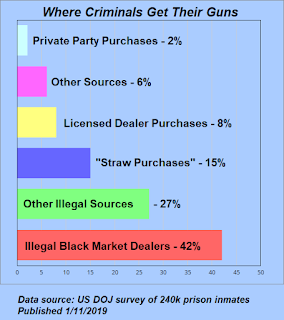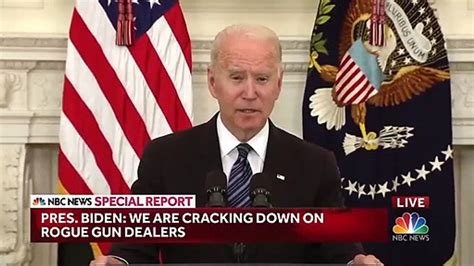Myth #1: “Rogue” gun dealers are a major source of crime guns
 This myth is easily disproved by referring to a US DOJ study conducted in 2016 and published in January 2019.
The goal of this study was to determine where criminals obtained
firearms. Researchers interviewed 240k inmates of prisons who had
firearms at the time of their arrest. This study is likely the
most comprehensive study of its’ kind, with the greatest amount of data
ever analyzed.
This myth is easily disproved by referring to a US DOJ study conducted in 2016 and published in January 2019.
The goal of this study was to determine where criminals obtained
firearms. Researchers interviewed 240k inmates of prisons who had
firearms at the time of their arrest. This study is likely the
most comprehensive study of its’ kind, with the greatest amount of data
ever analyzed.
So, what were the results?
As reflected in the chart, 77% of criminal’s firearms were obtained from sources other than legal gun dealers.
However, 23% of criminals firearms were obtained directly from gun dealers. Surely this must mean that there are a lot of gun dealers knowingly selling to criminals, right?
Wrong!!
Let’s look at how criminals get guns from these dealers:
2/3 of the 23% of guns obtained from dealers were obtained via straw purchases. In a straw purchase, a prohibited person finds a non-prohibited person to walk into the dealer and buy a gun for them. This is a felony, punishable by up to 5 years in prison per offense. Sadly, most straw purchasers, if caught, will not spend a day in prison.
Sometimes, it is obvious that someone is conducting a straw purchase – and the vast majority of dealers will refuse such sales – but most of the time, there is no way that a dealer can know that, outside of their presence, the gun will be handed over to someone else. The fact that straw purchases have taken place at a dealer does not make that dealer “rogue”. Furthermore, the firearms industry and the ATF have cooperated in a program to discourage straw purchases.
The remaining 1/3 of criminal’s firearms obtained from dealers (8% of the overall total) were obtained via an over the counter purchase by the criminal. Surely this is proof that there are rogue dealers intentionally selling to criminals, right?
Wrong again!!
There are two primary ways in which a dealer, in full compliance with the law, might unknowingly sell a firearm to a criminal:
The first is that the criminal had not yet been convicted of a crime. Therefore their background check would come back as approved. Does simply selling guns to people approved by the FBI make a dealer “rogue”?
The second is that the criminal has simply “lied and tried” – something that Obama’s ATF director said should not even be prosecuted. The criminal simply lies on the form and tries to buy a firearm, in hopes that they have not been reported for inclusion in the database. If they are denied, they simply turn to illegal sources – if they are approved, they get the gun. Prosecution rates are so low that they are taking little risk.
Again, how does selling a gun to someone approved by the FBI make that dealer “rogue”?
Finally, there is the average time from sale to crime. If gun dealers are knowingly selling to criminals, this time should be short. However, it isn’t – the average is over 10 years. The reason is simple: Most crime guns are stolen directly by criminals for their use, or to supply black market dealers.
The bottom line is simple: The number of crime guns obtained from dealers selling in violation of law is exceedingly small. Even if all of them could be eliminated, the result would be too small to measure. The idea that there are a significant number of rogue dealers is simply absurd.
Myth #2: Rogue gun dealers can be identified by the number of ATF traces
 The
Biden administration states that gun dealers with many traces are rogue
sources of crime guns. Again, this sounds logical – but is far
from it.
The
Biden administration states that gun dealers with many traces are rogue
sources of crime guns. Again, this sounds logical – but is far
from it.
ATF traces are done when a gun shows up at a crime scene. Chances are that the gun was stolen years before. A traced firearm in no way indicates that the dealer did anything wrong.
What can result in a gun dealer having a high number of traces? Surprisingly, a large number of traces is likely the result of selling a lot of guns. There are two ways that a dealer can sell a lot of guns:
1) They may have been in business a long time. Consider two dealers of the same size, with the same volume of sales. One has been in business for 5 years, the other for 25 years. Which one will have sold the largest number of guns? Which one will have the largest number of traces? The answers are obvious. The longer a dealer has been in business, the more guns they will have sold, and the greater chance that one of “their guns” will be found at a crime scene.
2) They may be a large volume dealer. Most gun dealers are small operations, family businesses often run by retired cops or military – however, as in any industry, there are larger businesses. These stores may be single stores that do a lot of business or, more likely, they are part of a chain. The size of the gun department at Cabellas or Sportsman’s Warehouse is much larger than the average gun store and certainly sells many more guns than the average small shop.
It should be clear that the number of traces alone is useless when it comes to identifying the tiny number of gun dealers who intentionally and illegally sell to criminals and other prohibited persons.
So, what would be an indication that a dealer is doing this? Well, a high number of traces with a short “time to crime” should raise suspicions and trigger an investigation. However, this is exceptionally rare.
Myth #3: Only rogue dealers have violations of ATF regulations
Again, on the surface, this sounds logical and reasonable – but upon examination, it simply is neither.
 As one would expect, selling firearms involved a great deal of paperwork. Every dealer is going to have errors.
Some examples include: Transposing digits in a serial number. The
customer using an abbreviation on the 4473 application to purchase form
(i.e. writing “LA” in the county field). Transposing the number
in the address field when copying the sales info from the 4473 form to
the “bound book” in which all firearms are logged in and out of the
store – and the list goes on and on.
As one would expect, selling firearms involved a great deal of paperwork. Every dealer is going to have errors.
Some examples include: Transposing digits in a serial number. The
customer using an abbreviation on the 4473 application to purchase form
(i.e. writing “LA” in the county field). Transposing the number
in the address field when copying the sales info from the 4473 form to
the “bound book” in which all firearms are logged in and out of the
store – and the list goes on and on.
Every gun dealer is audited, and they never know when this will happen. Therefore they try very hard not to make mistakes. When an audit turns up a mistake of mistakes, the ATF has only three choices: Use the mistake as a teaching opportunity to help the dealer improve, issue a formal warning, or move to revoke the dealer’s license. Clearly there are cases where the last remedy should be applied, but they are few and far between.
Today and in the past, ATF auditors have usually used mistakes as teaching opportunities. They have seen their job as being to help dealers create accurate records. Now however, the Biden administration is telling those auditors that they are to have ZERO TOLERANCE for violations. There is only one way that these auditors are going to understand this directive: “My job is now to revoke as many licenses as possible.”
Of course, this is exactly the intent. The actual goal is to put every gun dealer out of business – gradually, of course. They will begin with the worst violators, then gradually become more and more strict until the vast majority of dealers give up. They will be assisted by the banking industry that will view such businesses as “high risk”. Good luck getting a business loan……
The 2nd Amendment doesn’t have any practical application if there is no place to buy a gun, and anyone who has been paying attention knows that this is the end goal of the Biden administration.
Rev. R. Vincent Warde
6-25-2021
 This myth is easily disproved by referring to a US DOJ study conducted in 2016 and published in January 2019.
The goal of this study was to determine where criminals obtained
firearms. Researchers interviewed 240k inmates of prisons who had
firearms at the time of their arrest. This study is likely the
most comprehensive study of its’ kind, with the greatest amount of data
ever analyzed.
This myth is easily disproved by referring to a US DOJ study conducted in 2016 and published in January 2019.
The goal of this study was to determine where criminals obtained
firearms. Researchers interviewed 240k inmates of prisons who had
firearms at the time of their arrest. This study is likely the
most comprehensive study of its’ kind, with the greatest amount of data
ever analyzed.So, what were the results?
As reflected in the chart, 77% of criminal’s firearms were obtained from sources other than legal gun dealers.
However, 23% of criminals firearms were obtained directly from gun dealers. Surely this must mean that there are a lot of gun dealers knowingly selling to criminals, right?
Wrong!!
Let’s look at how criminals get guns from these dealers:
2/3 of the 23% of guns obtained from dealers were obtained via straw purchases. In a straw purchase, a prohibited person finds a non-prohibited person to walk into the dealer and buy a gun for them. This is a felony, punishable by up to 5 years in prison per offense. Sadly, most straw purchasers, if caught, will not spend a day in prison.
Sometimes, it is obvious that someone is conducting a straw purchase – and the vast majority of dealers will refuse such sales – but most of the time, there is no way that a dealer can know that, outside of their presence, the gun will be handed over to someone else. The fact that straw purchases have taken place at a dealer does not make that dealer “rogue”. Furthermore, the firearms industry and the ATF have cooperated in a program to discourage straw purchases.
The remaining 1/3 of criminal’s firearms obtained from dealers (8% of the overall total) were obtained via an over the counter purchase by the criminal. Surely this is proof that there are rogue dealers intentionally selling to criminals, right?
Wrong again!!
There are two primary ways in which a dealer, in full compliance with the law, might unknowingly sell a firearm to a criminal:
The first is that the criminal had not yet been convicted of a crime. Therefore their background check would come back as approved. Does simply selling guns to people approved by the FBI make a dealer “rogue”?
The second is that the criminal has simply “lied and tried” – something that Obama’s ATF director said should not even be prosecuted. The criminal simply lies on the form and tries to buy a firearm, in hopes that they have not been reported for inclusion in the database. If they are denied, they simply turn to illegal sources – if they are approved, they get the gun. Prosecution rates are so low that they are taking little risk.
Again, how does selling a gun to someone approved by the FBI make that dealer “rogue”?
Finally, there is the average time from sale to crime. If gun dealers are knowingly selling to criminals, this time should be short. However, it isn’t – the average is over 10 years. The reason is simple: Most crime guns are stolen directly by criminals for their use, or to supply black market dealers.
The bottom line is simple: The number of crime guns obtained from dealers selling in violation of law is exceedingly small. Even if all of them could be eliminated, the result would be too small to measure. The idea that there are a significant number of rogue dealers is simply absurd.
Myth #2: Rogue gun dealers can be identified by the number of ATF traces
 The
Biden administration states that gun dealers with many traces are rogue
sources of crime guns. Again, this sounds logical – but is far
from it.
The
Biden administration states that gun dealers with many traces are rogue
sources of crime guns. Again, this sounds logical – but is far
from it.ATF traces are done when a gun shows up at a crime scene. Chances are that the gun was stolen years before. A traced firearm in no way indicates that the dealer did anything wrong.
What can result in a gun dealer having a high number of traces? Surprisingly, a large number of traces is likely the result of selling a lot of guns. There are two ways that a dealer can sell a lot of guns:
1) They may have been in business a long time. Consider two dealers of the same size, with the same volume of sales. One has been in business for 5 years, the other for 25 years. Which one will have sold the largest number of guns? Which one will have the largest number of traces? The answers are obvious. The longer a dealer has been in business, the more guns they will have sold, and the greater chance that one of “their guns” will be found at a crime scene.
2) They may be a large volume dealer. Most gun dealers are small operations, family businesses often run by retired cops or military – however, as in any industry, there are larger businesses. These stores may be single stores that do a lot of business or, more likely, they are part of a chain. The size of the gun department at Cabellas or Sportsman’s Warehouse is much larger than the average gun store and certainly sells many more guns than the average small shop.
It should be clear that the number of traces alone is useless when it comes to identifying the tiny number of gun dealers who intentionally and illegally sell to criminals and other prohibited persons.
So, what would be an indication that a dealer is doing this? Well, a high number of traces with a short “time to crime” should raise suspicions and trigger an investigation. However, this is exceptionally rare.
Myth #3: Only rogue dealers have violations of ATF regulations
Again, on the surface, this sounds logical and reasonable – but upon examination, it simply is neither.
 As one would expect, selling firearms involved a great deal of paperwork. Every dealer is going to have errors.
Some examples include: Transposing digits in a serial number. The
customer using an abbreviation on the 4473 application to purchase form
(i.e. writing “LA” in the county field). Transposing the number
in the address field when copying the sales info from the 4473 form to
the “bound book” in which all firearms are logged in and out of the
store – and the list goes on and on.
As one would expect, selling firearms involved a great deal of paperwork. Every dealer is going to have errors.
Some examples include: Transposing digits in a serial number. The
customer using an abbreviation on the 4473 application to purchase form
(i.e. writing “LA” in the county field). Transposing the number
in the address field when copying the sales info from the 4473 form to
the “bound book” in which all firearms are logged in and out of the
store – and the list goes on and on.Every gun dealer is audited, and they never know when this will happen. Therefore they try very hard not to make mistakes. When an audit turns up a mistake of mistakes, the ATF has only three choices: Use the mistake as a teaching opportunity to help the dealer improve, issue a formal warning, or move to revoke the dealer’s license. Clearly there are cases where the last remedy should be applied, but they are few and far between.
Today and in the past, ATF auditors have usually used mistakes as teaching opportunities. They have seen their job as being to help dealers create accurate records. Now however, the Biden administration is telling those auditors that they are to have ZERO TOLERANCE for violations. There is only one way that these auditors are going to understand this directive: “My job is now to revoke as many licenses as possible.”
Of course, this is exactly the intent. The actual goal is to put every gun dealer out of business – gradually, of course. They will begin with the worst violators, then gradually become more and more strict until the vast majority of dealers give up. They will be assisted by the banking industry that will view such businesses as “high risk”. Good luck getting a business loan……
The 2nd Amendment doesn’t have any practical application if there is no place to buy a gun, and anyone who has been paying attention knows that this is the end goal of the Biden administration.
Rev. R. Vincent Warde
6-25-2021
 Three Myths Biden Wants The ATF To Use To Shutdown Your Gun Dealer
Three Myths Biden Wants The ATF To Use To Shutdown Your Gun Dealer








